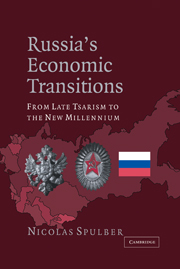Book contents
- Frontmatter
- Contents
- Figures and Tables
- Preface
- PART I THE TSARIST ECONOMIC TRANSITION
- PART II THE SOVIET ECONOMIC TRANSITION
- 10 The Socioeconomic Framework
- 11 The Transition Issues
- 12 The Economic Policies
- 13 The Problems of Agriculture
- 14 The Industrial Changes
- 15 Domestic and Foreign Trade
- 16 Money and Banking
- 17 State Finance
- 18 Overall View
- PART III THE POST-SOVIET ECONOMIC TRANSITION
- Index
18 - Overall View
Published online by Cambridge University Press: 03 December 2009
- Frontmatter
- Contents
- Figures and Tables
- Preface
- PART I THE TSARIST ECONOMIC TRANSITION
- PART II THE SOVIET ECONOMIC TRANSITION
- 10 The Socioeconomic Framework
- 11 The Transition Issues
- 12 The Economic Policies
- 13 The Problems of Agriculture
- 14 The Industrial Changes
- 15 Domestic and Foreign Trade
- 16 Money and Banking
- 17 State Finance
- 18 Overall View
- PART III THE POST-SOVIET ECONOMIC TRANSITION
- Index
Summary
Transition and the Agricultural Economy
The social transformation of the peasantry and the industrialization of agriculture were central to the Soviet conception of Russia's transition from a semifeudal capitalist system to a so-called socialist and thence to a communist system. In the Bolshevik conception, as Lenin affirmed many times on the eve of 1917, as long as Russia lived in a small peasant country, there was “a surer economic basis for capitalism in Russia than for communism.” Capitalism, he asserted, depended on small-scale production; the only way to undermine capitalism was to place the economy, including agriculture, on the basis of “modern large-scale production.” Emphasizing Lenin's thesis, Stalin affirmed on the eve of the planning era, in 1928, that Russia had to replace “the scattered and backward small-scale economy of the peasants” with an agricultural system based on the new technological foundation of “large-scale production.” Either we place the economy on the foundations of the most large-scale industry and of an agriculture of a new technical basis, added Stalin, “or we turn away from it and do not accomplish it, in which case a return to capitalism may become inevitable.” In essence, the transition to socialism was predicated on industry as the main foundation, but also on a reconstructed, industrialized, and collectivized agriculture, viewed as the necessary basis of industry's own development.
- Type
- Chapter
- Information
- Russia's Economic TransitionsFrom Late Tsarism to the New Millennium, pp. 271 - 284Publisher: Cambridge University PressPrint publication year: 2003



